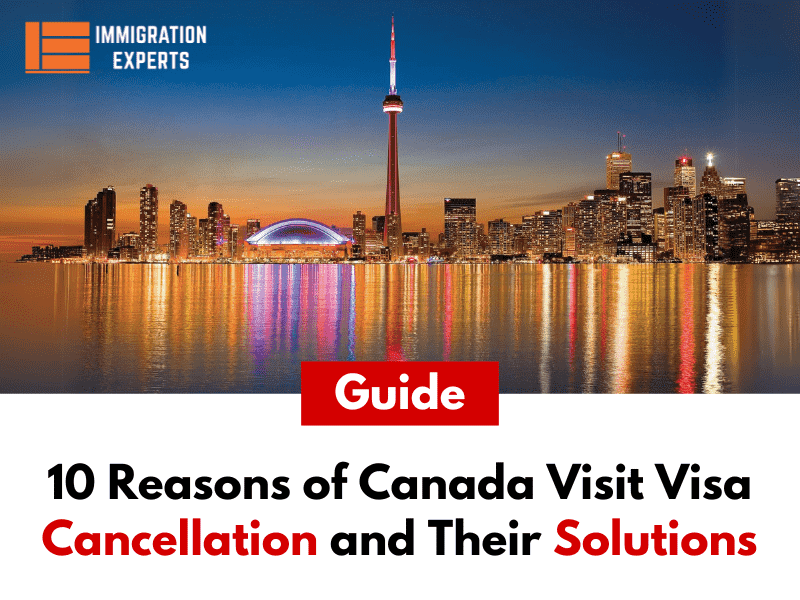051 8439995, 042 35911332

Canada can cancel your visit visa that’s already stamped in your passport for different reasons that may make it necessary.
A visit visa is given to people from other countries to visit family or friends, or for business reasons. It’s usually valid for up to 10 years or until your passport expires, whichever comes first.
Normally, a visitor can stay in Canada for up to 6 months at a time. If needed, they can apply to extend their stay by giving valid reasons.
Canada has long been a popular destination for travelers from around the world. However, there have been recent reports that IRCC is canceling the valid visit visas of many foreign nationals.
It’s important to note that this action is within the IRCC’s authority. Having a visit visa doesn’t guarantee that you will be allowed to enter Canada each time while your visa is still valid.
Various situations can lead to the cancellation of your visit visa. Additionally, you might be denied entry when you arrive at the port of entry. If a CBSA officer has concerns or doubts about the purpose of your visit, this could be enough to justify canceling your visa or refusing entry.
This can happen even if you’ve entered Canada before and then returned to your home country.
It’s important to understand the reasons behind visit visa cancellations to stay compliant and ensure a hassle-free travel experience.
Here are the top 10 reasons why IRCC might cancel a valid visit visa:
Things You Will Find In This Page
1. Misrepresentation and Fraud
Misrepresentation involves giving false information or hiding important details during the visa application process, which leads to visa approval.
If IRCC later discovers this, they can cancel your visa and ban you from entering Canada for up to five years.
Solution:
- Be Honest and Accurate: Always provide truthful and accurate information on your visa application. Review all documents carefully to avoid mistakes.
- Submit Genuine Documents: Make sure all documents you submit are real and can be verified. Never use fake or altered documents.
- Consult a Professional: If you’re uncertain about any part of the application, get help from a licensed immigration consultant or lawyer.
2. Criminal Convictions
Having a criminal record, especially for serious offenses or recent convictions, can lead to the cancellation of a visit visa.
If a person holding a valid visit visa is convicted of a serious crime, their visa could be canceled.
Solution:
- Disclose Your Criminal History: Be upfront about any criminal records during the application process and provide any necessary proof of rehabilitation.
- Seek Legal Advice: If you have a criminal record, it’s wise to consult an immigration lawyer to understand your options.
- Consider Rehabilitation: In some situations, applying for criminal rehabilitation can help you overcome barriers to admissibility and retain your visa.

3. Past Immigration Violations
Having a history of immigration violations, like overstaying a previous visit or giving false information, can lead to the cancellation of a visit visa.
Solution:
- Follow the Rules: Always comply with visa regulations and adhere to the conditions of your stay.
- Address Previous Issues: If you have past violations, seek help from an immigration expert to resolve and correct these issues before applying again.
- Keep Records: Maintain documentation proving your adherence to immigration laws, such as evidence of leaving Canada as required.
4. Purpose of Visit and Return Ticket
Your visit visa might be canceled or you could be denied entry if:
- Your visit does not match the purpose you stated in your initial application, or
- You lack a return ticket that matches the duration of stay you initially requested.
Solution:
- Be Consistent: Ensure that the purpose of your visit remains the same as what you stated in your initial visa application.
- Get a Return Ticket: Obtain a return ticket that aligns with the length of stay you requested in your visa application, especially for your first visit.
5. Misleading Information
Avoid being misled by hearsay or anecdotal examples where someone claims their visa wasn’t canceled despite not following the rules. IRCC’s decisions are based on a range of factors and vary from case to case. Some individuals might not face scrutiny, but that doesn’t mean everyone will be treated the same way.
Solution:
- Ignore Hearsay: Don’t rely on unofficial stories or advice. Stay informed by checking the latest updates on Canadian immigration directly from the official IRCC website.
6. Insufficient Financial Support
Visitors need to show they have enough financial resources to cover their stay in Canada. If you don’t have adequate financial support, your visa might be canceled.
For example, if you temporarily borrow money to appear financially secure during the application but return it after getting the visa, this is not acceptable.
Solution:
- Provide Proof of Funds: Submit bank statements, employment letters, or other documents showing you have sufficient funds for your stay, both at the time of visa approval and upon arrival.
- Ensure Financial Stability: Have enough personal savings to support your stay without relying on public or borrowed funds.
- Update Financial Information: If your financial situation changes, update your financial documents and inform immigration authorities accordingly.

7. Failure to Prove Intent to Leave
Visitors need to show they plan to leave Canada after their stay, even if their visa is approved. If a CBSA officer questions you at the airport about why you will leave Canada after your visit, failing to provide a convincing answer can lead to visa cancellation.
Solution:
- Demonstrate Strong Ties: Ensure you can clearly explain your reasons for returning, based on the information you provided in your application.
- Maintain a Positive Travel Record: Follow visa rules in other countries to build a good travel history.
- Provide Supporting Documents: Include documents such as employment letters, school enrollment records, or proof of property ownership to show your intention to return.
8. Poor Travel History
A negative travel history, including previous overstays or visa rejections, can affect the validity of your current visa.
For instance, even if you follow Canada’s visa rules, violations in other countries may still lead to visa cancellation.
Solution:
- Keep a Positive Record: Always follow visa regulations in every country you visit.
- Explain Past Issues: If you have a history of visa problems, provide explanations and evidence of your compliance in future travels.
- Consistent Compliance: Show consistent adherence to visa rules across all your travels.
9. Security Concerns
If a visitor is considered a security threat, their visa can be canceled. For example, if a visa holder becomes involved with a designated terrorist group, their visa might be revoked.
Solution:
- Maintain a Clear Record: Ensure you are not involved in activities that could be seen as a threat to national security or public safety.
- Provide Complete Information: Submit all necessary documents, including police clearance certificates, to demonstrate that you do not pose a security risk.
10. Changes in Circumstances
Significant changes in your situation, such as losing a job or changes in family status, can lead to visa cancellation.
Solution:
- Notify Authorities: Inform immigration officials of any major changes in your circumstances as soon as possible.
- Update Documentation: Provide updated documents that reflect your new situation, such as new job letters or changes in family status.
- Ensure Consistency: Make sure your current circumstances match the information you provided in your visa application.
Following visa regulations and being transparent throughout the application process are essential for a smooth visit to Canada.
Knowing the reasons a visa might be canceled helps visitors avoid potential issues, ensuring a smoother and more enjoyable stay in Canada. By being aware of these potential issues and taking proactive measures to address them, visitors can better safeguard their visa status and have a trouble-free experience in Canada.
